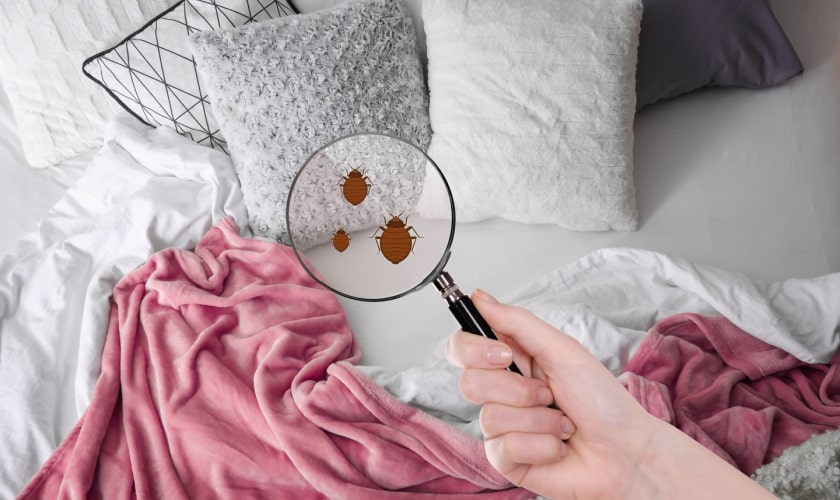Kings Cincinnati Pest Control Companies: Reliable Services
Kings Cincinnati Pest Control Companies: Reliable Services
Blog Article
Kinds Of Bug Control: Which Technique Is Right for Your Invasion?
When encountered with a bug problem, the choice of an ideal technique for parasite control is important in properly managing the circumstance. By discovering the numerous types of insect control techniques readily available, individuals can make informed decisions customized to their one-of-a-kind circumstances, guaranteeing an extra effective and sustainable outcome in insect elimination.
Chemical Parasite Control
Chemical insect control involves making use of artificial or normally acquired chemicals to take care of and eradicate pest populations efficiently. This method is frequently utilized in agriculture, forestry, and residential settings to fight a wide variety of bugs, consisting of bugs, weeds, and rodents. Using chemical pesticides can offer quick and targeted services to pest infestations, making it a popular choice for many people and organizations.
Among the crucial advantages of chemical insect control is its ability to swiftly remove pests, reducing the threat of damages to plants, residential property, and human health and wellness. By utilizing particular chemicals that target particular parasites, this approach can properly manage infestations while minimizing injury to valuable microorganisms and the atmosphere when used properly.
However, making use of chemical parasite control likewise raises problems regarding potential damaging impacts on non-target species, water resources, and human health. It is crucial to comply with safety standards, apply chemicals responsibly, and take into consideration alternative parasite control approaches to reduce these risks and make certain sustainable pest monitoring techniques.
Organic Parasite Control
Organic insect control, additionally understood as biocontrol, utilizes living microorganisms to take care of and minimize pest populaces naturally. This technique harnesses the power of nature to manage parasites without the need for artificial chemicals. Biocontrol can involve the intro of natural opponents of the pest types, such as microorganisms, bloodsuckers, or killers, to suppress insect populaces. By utilizing the insect's natural killers or virus, organic pest control offers a lasting and environmentally friendly service to pest monitoring.

Mechanical Insect Control
Making use of physical and hands-on techniques to take care of bug populations, mechanical bug control offers a different method that does not depend on the use of living organisms or synthetic chemicals. This approach entails making use of barriers, catches, or other gadgets to literally discourage or remove pests. By obstructing parasite entry factors or establishing traps to catch them, mechanical bug control can efficiently lower invasions without presenting chemicals right into the environment.
One typical instance of mechanical parasite control is using mesh screens on doors and home windows to stop insects from going into structures. This straightforward yet efficient technique works as a physical barrier, keeping insects out while enabling correct air flow. Additionally, devices like mousetraps, fly swatters, and ultrasonic repellents fall under the mechanical pest control group.
While mechanical pest control methods can be labor-intensive and need routine tracking and upkeep, they use a lasting and environmentally friendly service for handling bug invasions. By incorporating various mechanical strategies, residential property proprietors can develop a thorough parasite control strategy that minimizes dependence on chemical pesticides.
Physical Pest Control

Some common physical bug control approaches include using barriers such as screens or internet to stop parasite entrance, catches to capture and eliminate parasites, and hand-picking to physically get rid of pests from plants or structures. In addition, techniques like warm therapies can be used to manage good pest control parasites like bed bugs by increasing the temperature level to levels that are lethal to the bugs.
Physical parasite control is particularly beneficial in incorporated pest management (IPM) methods, where numerous pest control techniques are incorporated for reliable pest administration while decreasing using chemicals. By utilizing physical insect control methods, people can effectively deal with insect infestations with very little environmental effect.
Integrated Insect Monitoring
When implementing physical insect control techniques as part of insect administration methods, Integrated Bug Monitoring (IPM) becomes a thorough strategy that leverages numerous strategies to effectively regulate pest populaces. IPM concentrates on lasting avoidance of bugs via a mix of organic, social, physical, their explanation and chemical tools tailored to particular insect issues. By integrating numerous control methods, IPM intends to lessen the risks related to parasites while additionally minimizing reliance on chemical services.
One key facet of IPM is the focus on tracking and evaluating pest populations to establish one of the most suitable control methods. This aggressive strategy enables early treatment and targeted methods, causing much more efficient parasite administration. Additionally, IPM promotes eco-friendly methods by focusing on non-chemical control techniques and just utilizing pesticides as a last option.
Final Thought

By using the insect's natural predators or pathogens, organic pest control provides a eco friendly and sustainable service to pest management. - Kings cincinnati pest control
Making use of hands-on and physical methods to take care of insect populations, mechanical parasite control uses an alternative strategy that does not depend on the use of living microorganisms or synthetic chemicals.An effective strategy to handling pest populaces without relying on chemical or organic techniques involves the usage of physical insect control strategies.When applying physical bug control methods as component of parasite administration techniques, Integrated Parasite Administration (IPM) arises as an extensive strategy that leverages various strategies to efficiently regulate pest populations. Chemical bug control involves the usage of pesticides, biological pest control uses all-natural predators, mechanical bug control involves physical barriers, physical pest control includes capturing or eliminating pests, and integrated bug management integrates several approaches for an all natural strategy to pest control.
Report this page